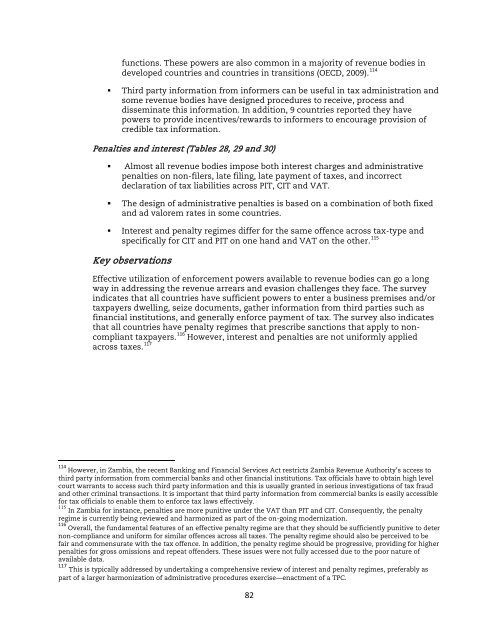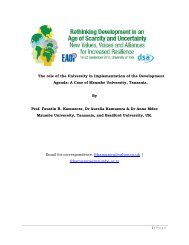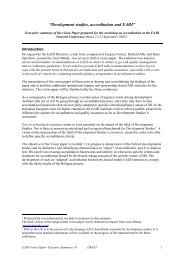Revenue Administration in Sub-Saharan Africa - International Tax ...
Revenue Administration in Sub-Saharan Africa - International Tax ...
Revenue Administration in Sub-Saharan Africa - International Tax ...
Create successful ePaper yourself
Turn your PDF publications into a flip-book with our unique Google optimized e-Paper software.
functions. These powers are also common <strong>in</strong> a majority of revenue bodies <strong>in</strong>developed countries and countries <strong>in</strong> transitions (OECD, 2009). 114• Third party <strong>in</strong>formation from <strong>in</strong>formers can be useful <strong>in</strong> tax adm<strong>in</strong>istration andsome revenue bodies have designed procedures to receive, process anddissem<strong>in</strong>ate this <strong>in</strong>formation. In addition, 9 countries reported they havepowers to provide <strong>in</strong>centives/rewards to <strong>in</strong>formers to encourage provision ofcredible tax <strong>in</strong>formation.Penalties and <strong>in</strong>terest (Tables 28, 29 and 30)• Almost all revenue bodies impose both <strong>in</strong>terest charges and adm<strong>in</strong>istrativepenalties on non-filers, late fil<strong>in</strong>g, late payment of taxes, and <strong>in</strong>correctdeclaration of tax liabilities across PIT, CIT and VAT.• The design of adm<strong>in</strong>istrative penalties is based on a comb<strong>in</strong>ation of both fixedand ad valorem rates <strong>in</strong> some countries.• Interest and penalty regimes differ for the same offence across tax-type andspecifically for CIT and PIT on one hand and VAT on the other. 115Key observationsEffective utilization of enforcement powers available to revenue bodies can go a longway <strong>in</strong> address<strong>in</strong>g the revenue arrears and evasion challenges they face. The survey<strong>in</strong>dicates that all countries have sufficient powers to enter a bus<strong>in</strong>ess premises and/ortaxpayers dwell<strong>in</strong>g, seize documents, gather <strong>in</strong>formation from third parties such asf<strong>in</strong>ancial <strong>in</strong>stitutions, and generally enforce payment of tax. The survey also <strong>in</strong>dicatesthat all countries have penalty regimes that prescribe sanctions that apply to noncomplianttaxpayers. 116 However, <strong>in</strong>terest and penalties are not uniformly appliedacross taxes. 117114 However, <strong>in</strong> Zambia, the recent Bank<strong>in</strong>g and F<strong>in</strong>ancial Services Act restricts Zambia <strong>Revenue</strong> Authority’s access tothird party <strong>in</strong>formation from commercial banks and other f<strong>in</strong>ancial <strong>in</strong>stitutions. <strong>Tax</strong> officials have to obta<strong>in</strong> high levelcourt warrants to access such third party <strong>in</strong>formation and this is usually granted <strong>in</strong> serious <strong>in</strong>vestigations of tax fraudand other crim<strong>in</strong>al transactions. It is important that third party <strong>in</strong>formation from commercial banks is easily accessiblefor tax officials to enable them to enforce tax laws effectively.115 In Zambia for <strong>in</strong>stance, penalties are more punitive under the VAT than PIT and CIT. Consequently, the penaltyregime is currently be<strong>in</strong>g reviewed and harmonized as part of the on-go<strong>in</strong>g modernization.116 Overall, the fundamental features of an effective penalty regime are that they should be sufficiently punitive to deternon-compliance and uniform for similar offences across all taxes. The penalty regime should also be perceived to befair and commensurate with the tax offence. In addition, the penalty regime should be progressive, provid<strong>in</strong>g for higherpenalties for gross omissions and repeat offenders. These issues were not fully accessed due to the poor nature ofavailable data.117 This is typically addressed by undertak<strong>in</strong>g a comprehensive review of <strong>in</strong>terest and penalty regimes, preferably aspart of a larger harmonization of adm<strong>in</strong>istrative procedures exercise—enactment of a TPC.82





